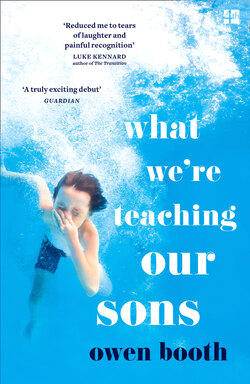Читать книгу What We’re Teaching Our Sons - Owen Booth - Страница 11
Whales
ОглавлениеWe’re teaching our sons about whales.
Their habits and habitats, their evolutionary history, their cultural and economic relevance, the many stories told about them.
An adult male sperm whale has washed up, dead, on a beach on the Norfolk coast, and we’re following the clean-up effort on TV and the radio and the internet. People are worried that the build-up of gas inside the decomposing whale carcass may cause it to explode. Onlookers have been moved back to a safe distance.
Our sons are gripped by the unfolding drama.
We tell our sons about the long relationship between people and whales – about the whaling industry, and the historical uses of baleen and blubber and ambergris and whalebone. We tell them about the hunting of minke whales and pilot whales and bowhead whales and fin whales and sei whales and humpback whales and grey whales and so on. We tell them the stories of Jonah and the whale, and Moby Dick, and what we can remember of the plot of the film Orca the Killer Whale, and about the whale that got lost and swam up the Thames in 2006.
‘Did you see the whale?’ our sons ask, excitedly.
‘Well no,’ we say, ‘we were out of the country at the time, but –’
‘What happened to the whale?’ our sons ask. ‘Was it rescued?’
We explain to our sons that, despite the best efforts of various organisations to save it, the Thames whale died two days after it was first spotted, from convulsions caused by dehydration and kidney failure. Everyone was very sad, we say. People had taken to calling the whale ‘Diana’. It was one of those moments when the whole nation comes together.
‘Except you, because you were out of the country,’ our sons say.
‘Well that’s true, yes,’ we admit.
On the TV, scientists and whale removal experts and members of the local council are reviewing their options. Dynamite is considered. Or burial. Apparently the smell is becoming unbearable. Luckily it’s winter, so the tourist trade hasn’t been too adversely affected. Nobody knows what caused the whale to wash up here – whether it was illness or a wrong turn or just old age.
‘Maybe he was murdered,’ our sons say. ‘Maybe sharks did it, or other whales. Maybe he had it coming. Maybe he was a bad whale.’
Eventually the experts decide to load the whale onto the back of an eighteen-wheel lorry. It takes two days to lay the temporary metal road across the beach, twelve hours to roll the corpse of the whale onto a cradle, hoist it up onto the trailer, tie it down under yards of tarpaulin and plastic sheeting.
Then, under cover of night, a police escort leads the lorry and its stinking cargo through the dark lanes of East Anglia.
At an undisclosed location, the television reports tell us, tissue samples will be taken and the whale will be cut up and incinerated.
And we will be left to explain to our sons what the whole thing means.
